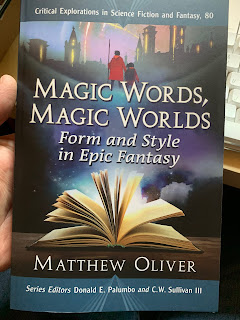Closing out British and American Literature: Beowulf to Milton (Fall 2022)
Submitted my final grades for my ENGL 373A: Brit Lit I (Beowulf to Milton) class on Friday. This was, hands down, the most fun I've ever had teaching. Partly it was just teaching something semi-within my research area. Partly it was teaching upper-division students in the major. Another part was just having a great bunch of students. Some vital stats for the course: 43,000 words of lesson plans created, plus D2L shell 6 PowerPoints created 150 quiz questions created 10 possible short essay questions created for mid-term and final 81% average grade in the class overall I checked for comparison, and my Monsters course only has 25,000 words of lesson plans. That's almost a direct result of studying for this course -- I'm not a medievalist or Early Modern scholar, so there was truly a prodigious amount of pre-course research involved. To help prep those lesson plans, I created an additional "historical notes" document that's another 13,000 words. Overall, ENGL 37

